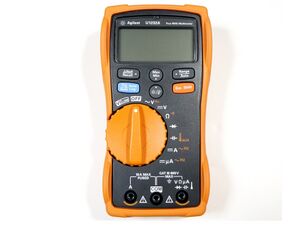Difference between revisions of "Agilent U1232A"
(→STAT) |
(→STAT) |
||
| Line 339: | Line 339: | ||
| 7 | | 7 | ||
| | | | ||
| ''Smoothing'' | | '''Smoothing''' | ||
|- | |- | ||
Revision as of 21:37, 2 September 2012
The Agilent U123xA are a series of low-cost 6000-count handheld digital multimeters. PC connectivity is via an IR port.
Hardware
- Renesas 78K0/LF3 8-bit microcontroller with 60K flash and 2K RAM on board.
Photos
Multimeter:
IR-USB cable:
See Multimeter cables#Agilent_U1173A.
IR-bluetooth interface:
See Multimeter cables#Agilent_U1177A.
Protocol
IDN
Sending the command *IDN? causes the device to return a comma-separated four-field string, compatible with the identical GPIB command. The four fields are vendor name, model name, serial number and version:
Agilent Technologies,U1232A,MY52020136,V1.00
FETC
The FETC? command returns the current measured value, as a floating point ASCII string:
+9.25000000E-03
The value always takes exactly this form. If no valid measurement is available, i.e. the display shows "OL", the transmitted value is +9.90000000E+37.
CONF
The CONF? command queries the device's current measurement configuration. This can be either one, two or three comma-separated fields. The number of fields depends on the first fields value, but the second field always denotes the measurement mode's range and resolution, and the third field is the current type (AC or DC).
| Mode | Res. | Cur. | Meaning |
|---|---|---|---|
| V | y | y | Volts |
| 0 | Range 600mV, resolution 0.1mV | ||
| 1 | Range 6V, resolution 1mV | ||
| 2 | Range 60V, resolution 0.01V | ||
| 3 | Range 600V, resolution 0.1V | ||
| MV | y | y | Millivolts |
| 1 | Range 600mV, resolution 0.1mV | ||
| A | y | y | Ampere |
| 0 | Range 6A, resolution 1mA | ||
| 1 | Range 10A, resolution 0.01A | ||
| UA | y | y | Microampere |
| 0 | Range 60μA, resolution 0.01μA | ||
| 1 | Range 600μA, resolution 0.1μA | ||
| FREQ | y | y | AC frequency |
| 0 | Always shows 0, even when the range is changed manually on the device. This is possibly a firmware bug. | ||
| RES | y | n | Resistance |
| 0 | Range 600Ω, resolution 0.1Ω | ||
| 1 | Range 6kΩ, resolution 0.001kΩ | ||
| 2 | Range 60kΩ, resolution 0.01kΩ | ||
| 3 | Range 600kΩ, resolution 0.1kΩ | ||
| 4 | Range 6MΩ, resolution 0.001MΩ | ||
| 5 | Range 60MΩ, resolution 0.01MΩ | ||
| CAP | y | n | Capacitance |
| 0 | Range 1000nF, resolution 1nF | ||
| 1 | Range 10μF, resolution 0.01μF | ||
| 2 | Range 100μF, resolution 0.1μF | ||
| 3 | Range 1000μF, resolution 1μF | ||
| 4 | Range 10mF, resolution 0.01mF | ||
| DIOD | n | n | Diode |
STAT
The STAT? command is used to query the current state of the device. The response is a quoted 21-byte string, like this:
"000000000110L00000000"
| Byte | Value | Meaning |
|---|---|---|
| 1 | Max/min mode | |
| 0 | Off | |
| 1 | On | |
| 2 | Relative measurement. The last value returned from FETC? before this mode was enabled denotes the stored reference value. | |
| 0 | Off | |
| 1 | On | |
| 3 | Trig hold-log | |
| 0 | Off | |
| 1 | On | |
| 4 | Auto hold-log | |
| 0 | Off | |
| 1 | On | |
| 5 | LED flashlight | |
| 0 | Off | |
| 1 | On | |
| 6 | LCD backlight | |
| 0 | Off | |
| 1 | On | |
| 7 | Smoothing | |
| 0 | Off | |
| 1 | On | |
| 8 | Temp/aux mode. When on and rotary switch is in position 5 (capacitance), CONF? returns MV,1,DC, but the value returned from FETC? instead denotes the temperature, in the unit (F or C) according to the meter's configuration.
| |
| 0 | Off | |
| 1 | On | |
| 9 | Unknown (always 0) | |
| 10 | Unknown (always 1) | |
| 11 | Auto power-off (APO) | |
| 0 | Off | |
| 1 | On | |
| 12 | Unknown (always 0) | |
| 13 | Unknown (always L) | |
| 14 | Unknown (always 0) | |
| 15 | Unknown (always 0) | |
| 16 | Rotary switch position | |
| 0 | V/Zlow | |
| 1 | Voltage AC | |
| 2 | Voltage DC | |
| 3 | Resistance | |
| 4 | Diode | |
| 5 | Capacitance | |
| 6 | Current | |
| 7 | Microcurrent | |
| 17 | Continuity mode. When enabled, the value returned from FETC? is either NAN (no continuity) or any real value to denote continuity. | |
| 0 | Off | |
| 1 | On | |
| 18 | Unknown (always 0) | |
| 19 | Unknown (always 0, but briefly 1 at startup) | |
| 20 | Unknown (always 0) | |
| 21 | Unknown (always 0) |






